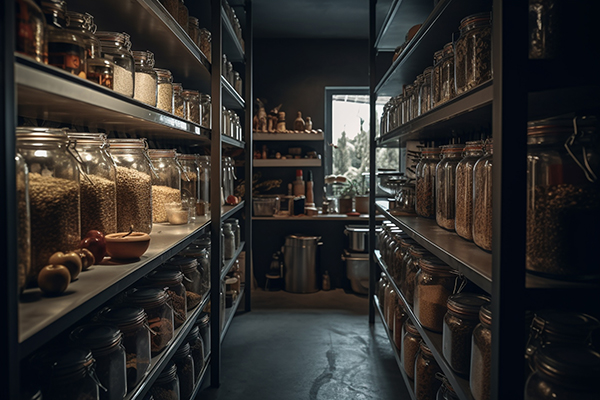Sample The Foods In Your Emergency Preparedness Long Term Storage
by Ken Jorgustin, Modern Survival Blog:
 For those who have established a long-term food storage (deep pantry) as part of your overall emergency preparedness, it is my opinion that you should occasionally sample your foods.
For those who have established a long-term food storage (deep pantry) as part of your overall emergency preparedness, it is my opinion that you should occasionally sample your foods.
Sometimes the food that we acquire for long-term storage is not necessarily the same foods that we may normally eat from day to day on a regular basis. Although it is generally advisable to “buy what you eat and eat what you store”, some of your purchased foods might be specialized in one way or another – such as #10 cans of freeze-dried foods or dehydrated foods of one variety or another. You may have purchased many pounds of wheat berries, beans, rice, and other dried goods – but have you actually prepared and eaten any of these foods?
You might be surprised at what you find…
Occasionally checking and actually sampling some of your food from the “deep pantry” will provide assurance that everything is okay.
You will be checking for:
-poor taste
-digestion issues
-bad or spoiled food
-food preparation issues
-good food rotation practices
Poor Taste
Chances are that there may be a variety of foods and food types that you have added to your storage which you don’t normally eat or have never sampled. This may be especially true for those who have purchased specifically tailored “survival preparedness food” either in bulk, #10 cans, or other form factors designed and sealed for the long term.
My own long term food storage is pretty well diversified and does also include a variety of purchases made during previous years from a number of preparedness-food vendors. Have I ever checked any of those foods? Yes, some of them. Occasionally we have opened up a #10 can of one food or another and tried it. It’s good to know what you’ve got and whether or not it’s actually palatable!
Have we ever discovered foods from our inventory that we don’t like? Yes. At least we found out and will make better decisions on future acquisitions.
A good way to avoid being stuck with foods that you may not like (poor taste) is to diversify. If you have a wide variety of foods, you will have a wide variety of tastes…
One note of caution regarding the prepper adage “Buy what you eat and eat what you store”… If you mostly eat pizza and ice-cream, maybe that’s not such a good idea! Although I personally like pizza and ice-cream (who doesn’t?!) the thing is that you should try to diversify your food storage so that you end up with somewhat of a nutritional balance too.
Digestion Issues
One thing that you want to avoid during a time when you’re digging into your food preps is digestion issues. It’s best to find out if you will have any issues by eating some of the foods that you haven’t tried yet.
As part of my diversified long-term food storage I also have a number of sealed pails of rice, beans, and wheat berries. Have we tried to make meals with these as a base? Yes, and you will soon discover that rice-n-beans taste so much better when you add other “stuff” to it! Spices, sauces, etc.. Also, too many beans in the system will, well, you know…
Similar issues may arise from sampling other foods that you’ve tucked away for “just in case”. Try them, sample them, make sure you’re body agrees with them.
Bad or Spoiled Food
Another good reason to check your food storage is to discover if any of them have gone bad. Look for signs of spoilage. If you have home-canned goods, check for popped lids. Check cans for rust. Check food packaging for rodent break-in. Things like that.
Food Preparation Issues
By utilizing and sampling some of your foods from the deep pantry, you may discover issues that you were unaware of with regards to food preparation or other things you might need.
Do you have bucket pails of wheat berries? Then do you know what to do with them? Are you equipped to mill them into flour? Have you actually made your own bread from it?
Imagine if the electricity is out. Can you still utilize your foods? Do you have the means and mechanisms to prepare them without electricity?
Good Food Rotation Practices
Ultimately, a great way to stay on top of your food storage is to regularly use them and rotate them. Consume the oldest foods first and then rotate. I wrote several articles about this. Here’s one: “FOOD STORAGE 101, Date and Rotate”


